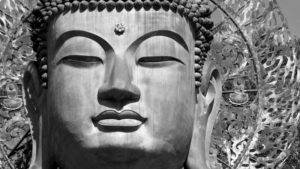22. Q: It says in the Precepts of the Bodhisattvas: “When sentient beings contemplate the Buddha Principle, they then assume the stature of all Buddhas, which is analogous to the Great Enlightenment; in so doing they become noble children of the Buddhas.” Please explain.
A: The Buddha Principle signifies perfect clarity and purity of mind. In undertaking this perfect nonattachment, one then transcends all skandhic obstructions and thus fully recognizes the Buddha Principle. All of the preceding Buddhas engaged this perfect principle and thereby remained impervious to all defiled dharmas and thus won the crown of Buddhahood. If one engages this perfect mind principle, then one is said to receive the merit of all Buddhas; hence, they will soon be knocking on the door of Buddhahood itself. If one wins this perfect Mind Illumination then one is in league with the Great Enlightenment. These noble ones are truly children of the Buddha and their mind engenders holy wisdom.
23. Q: In regard to the Buddha and the Dharma—which one preceded the other? If the Dharma is said to come first, then how could there have been any Buddha present to proclaim it? In the same vein, if the Buddha came first, then upon what possible Dharma did he rely upon to win full illumination?
A: In one fashion, the Buddha preceded the Dharma; in another one, he succeeded it.
Q: How is this even possible?
A: If you are referring to the Dharma of the Void, then the Dharma antecedes the Buddha. If, however, you mean the Dharma that is expounded in the Sutras and is expressed through expedient means, then the Buddha precedes the Dharma. How can this be so? Since the Buddha’s are dependent upon remaining quiescent in the Imageless Unborn Buddha Mind in order to properly incur their illumination, then in that sense, the Dharma of the Unborn Buddha Mind precedes them. On the other hand, the Dharma conveyed in a Sutra, for example, cannot be borne unless it issues forth from the Blessed lips of the Tathagata; thus the Tathagata’s own Buddhadharma is the antecedent agency.
Another way of expressing this in a way that no bifurcation is present can be found in the Anūnatvāpūrṇatvanirdeśaparivarta, that conveys the [Dharma]-Body is inseparable from the Tathagatas:
“As I have expounded, Śāriputra, the meaning of the dharma-body is inseparable from, indivisible from, not cut-off from, not different from the inconceivable qualities definitive of a Buddha, greater in number than the sands of the Ganges, [namely,] the merits and insight of a tathāgata…
“The Tathāgata’s dharma-body, Śāriputra, is permanent because of its quality of immutability, because of its quality of inexhaustibility…The Tathāgata’s dharma-body, Śāriputra, is tranquil because of its non-dual nature, because of its nature as free from discrimination. The Tathāgata’s dharma-body, Śāriputra, is unchangable because of its imperishable nature, because of its non-created nature.”
Thus, there is no discrepancy between the Nature of the Eternal-Dharma and its function in the Tathagatakaya—or the perfect embodied Mindfulness of the Tathagata; thus its Dharmatic imperative is crystal clear, undivided and imperishable.
24. Q: What is the reality behind the assertion that the Dharma is transmitted through words but not through Ch’an?
A: When words are considered as being different from action, then what is being transmitted through words is not channeled through action.
Q: Well, then, how can Dharma be transmitted through both Ch’an and words?
A: This occurs when words are in no sense different from action, then there is an equanimity and thus an undivided transmission between Ch’an and words.
It also needs to be asserted here that the nature of Ch’an can also be action-less.
25. Q: What is being conveyed when a sutra says: “To arrive is not to attain the reachable, while to not arrive means to attain what is unreachable?”
A: To “arrive while not attaining the reachable” means surface speech that is not supported through action; by “attaining what is unreachable” means action being able to perform what speech alone fails to reach. Complete Arrival, means the arrival of both unified speech and action.
26. Q: What is meant by the Buddhadharma neither rejects what is worldly, but by the same token neither clings to the transcendental?
A: When he sat beneath the Bodhi-Tree in order to become filled with the Unborn Light of Illumination, until the time when he entered into parinirvana, the Buddha never discarded a single dharma nor ever abandoned a single sentient entity. On the other hand, even though he won Samyak-Sambodhi, or inseparable Bodhi, he never accepted this as being something he attained. Thus, he never clung to associations that are considered to be transcendental accomplishments.
27. Q: Is there really a hell?
A: Yes and no.
Q: How is that?
A: Because sentient beings create evil karma, they are held bound by their actions and thus create self-made hells. However, if one’s mind is free from all karmic defilements, then no self-made hells will come into existence.
Q: Yet, if one is still bound to their Skandhic and karmic mind, do they still have a Buddha-nature?
A: Of course!
Q: Well, if that’s the case, will they still have their Buddha-nature if they should descend into hell?
A: They are never separate from their Buddha-nature.
Q: If that is so, does their Buddha-nature also suffer interminable agony in hell?
A: Buddha-nature is essentially neither existent nor non-existent. What suffers is the Skandhic mind and its ignominious past associations and thus karmic-residue.
Q: I still don’t comprehend! If their Buddha-nature is right along with them during their hellish torments, why doesn’t it equally suffer?
A: The Skandhic-mind is comprised of forms, sensations, thoughts, volitional habits and a mortal consciousness; thus it is subject to formalized destruction. Whereas, one’s Buddha-nature is unborn, uncreated, and thus formless, untouched and never subjected to what suffers in the creative order of things.
The nature of a “Buddhist Hell” does exist—something we shall cover most extensively in our next series of the same name.

